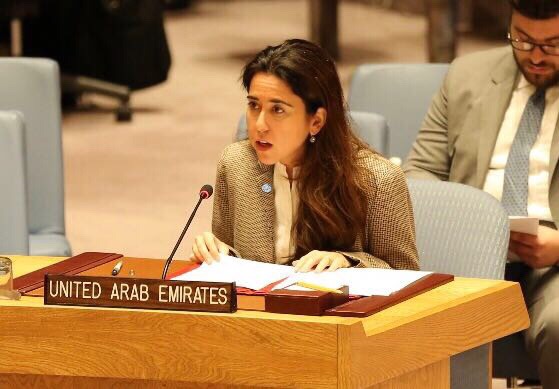NEW YORK – In a strong statement to the UN Security Council, the UAE expressed concern with growing disrespect for international law around the world, and particularly in the Middle East, at an Open Debate on upholding international law and the maintenance of international peace and security. The debate was hosted by Andrzej Duda, the President of Poland, which holds the presidency of the Security Council for May.
“A world without a rules-based international order is one filled with chaos and instability – one where rogue actors disregard international norms with impunity, the system of trusted relationships between countries is broken, and the most vulnerable across societies are left to suffer without recourse to justice,” emphasized Lana Nusseibeh, Ambassador and Permanent Representative of the UAE to the UN in New York.
Ambassador Nusseibeh recalled the tragedy in Gaza on 14 May that resulted in the abhorrent murder of over 60 innocent Palestinian civilians perpetrated by a UN Member State.
“The lives of the victims – men, women, and children – are no less human than any other in this Council, or any Member State in this United Nations, but have been treated by the inaction of this body as if somehow they were less human than the rest of us, and suffer less, and grieve their losses differently,” she stressed.

Ambassador Nusseibeh stated that the latest acts on the Gaza border violate multiple rules of international law and cannot be condoned or ignored by the international community. She stressed that although the UAE believes that Palestinian and Israeli people both have the right to secure statehood, when the Council’s resolutions on this matter are repeatedly ignored, and innocent human life is taken recklessly and violently, it weakens international law and the frameworks to make this aspiration possible.
Ambassador Nusseibeh also called out Iran’s disregard for international law and the Council’s sanctions regime in pursuit of its agenda of regional hegemony. She underscored that Iran’s behavior defies the fundamental international legal principle of non-intervention and noted that their support for terrorist groups in the region was in violation of several Security Council resolutions. Furthermore, Ambassador Nusseibeh reminded the Council that the US recently recognized this fact by withdrawing from the Joint Comprehensive Plan of Action (JCPOA) and called on other Member States to also hold Iran to the same standards.
Ambassador Nusseibeh further reiterated that all countries engaged in financing and supporting extremism and terrorism should be held accountable through the Council’s resolutions and the monitoring of financial flows. She asserted that if these countries were not held accountable by the international community, Member States have the sovereign right to act independently to defend their own security, as the UAE and others have done in the region.
In addition, she discussed how gross violations of international law continue in Syria –with seven years of civilian suffering from chemical weapons attacks and denial of humanitarian aid – and called for all parties to the conflict to cease their behavior and for perpetrators to be held to account.
“Fundamentally, the rules and norms that comprise the body of international law are only as strong as the commitment of all States to defend and uphold them,” she stated. “That is why the UAE stands ready to do its part in reinforcing the pillars of international law, including improving our own efforts to try and practice what we preach. In Yemen, we will continue to our utmost to ensure that aid reaches those most in need, whilst we undertake operations at the request of the legitimate government of Yemen.”
In concluding her remarks, Ambassador Nusseibeh proposed that the Council request a report from the Secretary-General on the various modalities of dispute settlement covered in Chapter VI of the UN Charter. This report would serve as a resource to Member States and would outline the use and practice of the modalities in mitigating disputes that have come before the UN, lessons learned from the practice, and guidance on applying the modalities for Member States
